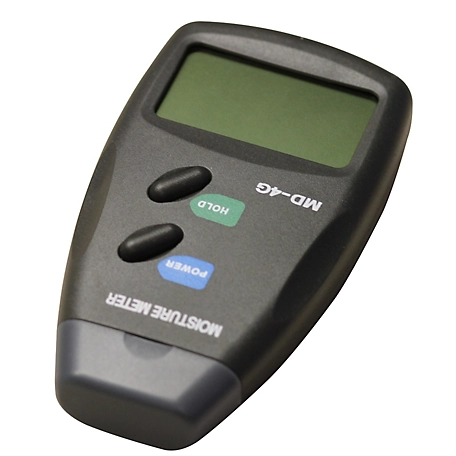The Ultimate Overview to Wetness Meters: A Comprehensive Introduction and Just How They Can Save You Money
Wetness meters offer as vital tools in finding and keeping an eye on moisture content in materials, helping in preventing expensive problems and ensuring the quality of items. Recognizing the nuances of different types of dampness meters, their applications, and the possible cost-saving benefits they provide can be a game-changer for services and specialists alike.
Kinds of Dampness Meters
Various sorts of wetness meters are readily available for various applications in various markets. One typical kind is the pin-type dampness meter, which gauges the electrical resistance between two pins placed right into a product. This kind appropriates for timber, drywall, and various other building materials. Pinless wetness meters, on the other hand, usage electromagnetic sensing unit plates to check a bigger area without triggering damages to the product's surface. Moisture Meter. These meters are optimal for swiftly assessing dampness levels in big areas such as walls and floors.

Furthermore, there are additionally specialized moisture meters made for certain materials like grain, hay, or soil. These meters supply accurate dampness readings tailored to the one-of-a-kind properties of the product being evaluated. Infrared moisture meters gauge the thermal homes of a material to establish its moisture web content non-invasively, making them beneficial for applications where pin or pinless meters may not appropriate. Comprehending the different kinds of moisture meters readily available can help sectors choose one of the most suitable device for their certain moisture measurement demands.

Benefits of Utilizing Wetness Meters
Wetness meters offer very useful advantages in accurately analyzing and checking moisture degrees in varied products and environments (Moisture Meter). Among the primary advantages of using moisture meters is the prevention of prospective damage created by excess moisture. By identifying and attending to high moisture levels at an early stage, dampness meters aid to stop mold and mildew development, rot, and structural damages in structures, conserving both time and money on repairs. Furthermore, wetness meters aid in making sure the high quality of products throughout building or production procedures. By properly gauging dampness web content, these devices assist preserve the stability of wood, drywall, concrete, and other materials, minimizing the threat of failings or issues.
Moreover, using moisture meters can lead to increased energy efficiency. In farming setups, wetness meters play a vital duty in maximizing plant returns by making it possible for farmers to keep track of dirt wetness levels and make informed watering choices.
Exactly How to Select the Right Wetness Meter
When picking a moisture meter, it's necessary to make sure that the meter is appropriate for the details product you will be testing. Different materials have varying electric residential properties that can influence dampness analyses, so choosing a meter designed for your material is critical for accurate outcomes. By thoroughly evaluating these variables, you can choose a wetness meter that meets your needs and provides accurate moisture dimensions for your projects.
Correct Techniques for Wetness Meter Usage

Cost Financial Savings Through Wetness Meter Applications
How can the tactical usage of moisture meters lead to considerable cost financial savings across numerous markets? In the agriculture market, moisture meters help in identifying the optimum time for harvesting crops, protecting against excess or over-drying moisture that can affect the final product's top quality.
Likewise, in construction, wetness meters aid stop costly problems by finding moisture degrees in building products, such as timber or concrete, which can result in architectural problems otherwise addressed without delay. By determining trouble areas early on, service providers can take corrective actions to avoid substantial fixings or replacements, eventually conserving money and time.
In addition, visit homepage in the food handling industry, wetness meters are essential for keeping an eye on go to this web-site item quality and making sure conformity with safety guidelines. By properly determining moisture web content in foodstuff, makers can avoid perishing, maintain freshness, and minimize waste, causing substantial cost savings. Generally, the critical application of dampness meters is a beneficial financial investment that can result in significant price reductions and enhanced performance throughout numerous markets.
Final Thought
Finally, dampness meters are beneficial devices for measuring and spotting moisture levels in various materials. By using the right dampness meter and following correct techniques, users can effectively prevent costly problems brought on by excess dampness. Spending in a high quality wetness meter can result in considerable expense savings in the long run by identifying possible concerns beforehand and enabling prompt remediation. Eventually, wetness meters are necessary instruments for preserving the honesty and durability of frameworks and products.
Dampness meters serve as indispensable tools in detecting and checking moisture material in products, aiding in stopping costly damages and making certain his response the quality of items. Infrared moisture meters determine the thermal homes of a product to determine its wetness content non-invasively, making them helpful for applications where pin or pinless meters might not be ideal.Moisture meters use important advantages in properly assessing and keeping an eye on wetness degrees in diverse materials and atmospheres. In farming settings, wetness meters play a critical role in enhancing plant returns by making it possible for farmers to monitor soil wetness degrees and make educated irrigation decisions.In final thought, dampness meters are important tools for identifying and measuring wetness levels in different products.
Comments on “The Science Behind Moisture Meters: How They Work and Why They're Important”